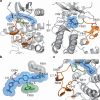Validation of ITD mutations in FLT3 as a therapeutic target in human acute myeloid leukaemia
- PMID: 22504184
- PMCID: PMC3390926
- DOI: 10.1038/nature11016
Validation of ITD mutations in FLT3 as a therapeutic target in human acute myeloid leukaemia
Abstract
Effective targeted cancer therapeutic development depends upon distinguishing disease-associated 'driver' mutations, which have causative roles in malignancy pathogenesis, from 'passenger' mutations, which are dispensable for cancer initiation and maintenance. Translational studies of clinically active targeted therapeutics can definitively discriminate driver from passenger lesions and provide valuable insights into human cancer biology. Activating internal tandem duplication (ITD) mutations in FLT3 (FLT3-ITD) are detected in approximately 20% of acute myeloid leukaemia (AML) patients and are associated with a poor prognosis. Abundant scientific and clinical evidence, including the lack of convincing clinical activity of early FLT3 inhibitors, suggests that FLT3-ITD probably represents a passenger lesion. Here we report point mutations at three residues within the kinase domain of FLT3-ITD that confer substantial in vitro resistance to AC220 (quizartinib), an active investigational inhibitor of FLT3, KIT, PDGFRA, PDGFRB and RET; evolution of AC220-resistant substitutions at two of these amino acid positions was observed in eight of eight FLT3-ITD-positive AML patients with acquired resistance to AC220. Our findings demonstrate that FLT3-ITD can represent a driver lesion and valid therapeutic target in human AML. AC220-resistant FLT3 kinase domain mutants represent high-value targets for future FLT3 inhibitor development efforts.
Figures


References
-
- Thiede C, et al. Analysis of FLT3-activating mutations in 979 patients with acute myelogenous leukemia: association with FAB subtypes and identification of subgroups with poor prognosis. Blood. 2002;99:4326–4335. - PubMed
-
- Lee BH, et al. FLT3 internal tandem duplication mutations induce myeloproliferative or lymphoid disease in a transgenic mouse model. Oncogene. 2005;24:7882–7892. - PubMed
-
- Shih LY, et al. Acquisition of FLT3 or N-ras mutations is frequently associated with progression of myelodysplastic syndrome to acute myeloid leukemia. Leukemia. 2004;18:466–475. - PubMed
-
- Knapper S, et al. A phase 2 trial of the FLT3 inhibitor lestaurtinib (CEP701) as first-line treatment for older patients with acute myeloid leukemia not considered fit for intensive chemotherapy. Blood. 2006;108:3262–3270. - PubMed
-
- Fischer T, et al. Phase IIB trial of oral Midostaurin (PKC412), the FMS-like tyrosine kinase 3 receptor (FLT3) and multi-targeted kinase inhibitor, in patients with acute myeloid leukemia and high-risk myelodysplastic syndrome with either wild-type or mutated FLT3. J. Clin. Oncol. 2010;28:4339–4345. - PMC - PubMed
Publication types
MeSH terms
Substances
Grants and funding
LinkOut - more resources
Full Text Sources
Other Literature Sources
Molecular Biology Databases
Research Materials
Miscellaneous

